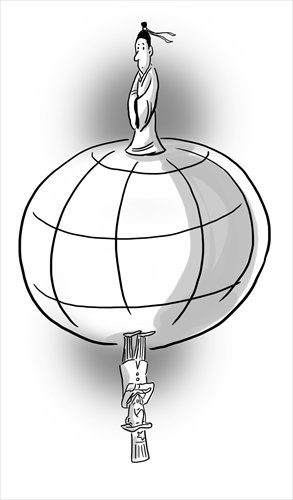US, China can adapt to each other

Illustration: Liu Rui/GT
The Permanent Court of Arbitration at The Hague is set to issue an award on the South China Sea case on July 12. China is sticking to non-acceptance and non-participation of the award while the US steps up its political and military deployment and intensifies pressure on China. There is a strong climate of confrontation between the two countries.
Since last year, there have been a lot of talks in Washington and US think tanks that the Sino-US relationship is coming to a tipping point or turning point. The presidents of China and the US held unusual summits at Sunnylands in California and Yingtai within the Zhongnanhai compound, and have deepened their communications by private and informal means. The two sides have set up nearly 100 dialogue mechanisms to maintain close contact and consultation.
However, the Sino-US relationship has gone downward during the presidency of Barack Obama. It remains highly uncertain where the bilateral relationship is heading.
When George W. Bush was US president, China and the US went through a honeymoon where their strategic cooperation was boosted. But during Obama's tenure, their primary target was avoiding conflicts and confrontation.
Over the past two years, Chinese President Xi Jinping advocated to US officials the notion of a new type of major power relationship, which features no confrontation, no conflict, mutual respect and win-win cooperation.
But the principle of mutual respect is hardly agreed to by the US as it is considered by the White House as a way to force itself to acknowledge China's core interests and respect China's core interests, system and ideology, which is impossible for the US.
Washington sees the notion of the new type of major power relationship as flamboyant rhetoric and believes it cannot cover up China's challenge to the US and the US-set order at bilateral, regional and even global level. Some Americans even think that this idea is not only trying to constrain the US, but also clearly shows China's ambition to challenge the US.
Forty years ago, regardless of their ideological differences and group politics, the leadership of Beijing and Washington joined hands across the Pacific to confront the Soviet Union. But today, while the ideological differences are fading and China's reforms expected by the US are coming true, China and the US can no longer be as cooperative as ever before.
US hawks already consider China as their country's top enemy. They hype up China's rising prowess when the US was mired in its global anti-terror war and Beijing's increasingly confident use of the power. What frustrates them more is that US engagement policy didn't prompt China to go along the Western path that develops the economy first and then adopts political democracy. On the contrary, the influence of China's model poses a major challenge to the US' liberal order. Hence hawks want strong countermeasures by Washington.
In recent years, the US State Department has enhanced its political investment in regions surrounding China, particularly East Asia, and the Pentagon intensified military alliance and presence in the Asia-Pacific region. Washington didn't adopt the hawkish suggestions, but it can hardly convince China that all that it is doing is participating in regional affairs and safeguarding regional order, with no intention to contain China.
However, as the two largest economies in the world have to coexist and face up to severe challenges together, they need to adapt to each other and adjust their own policies to forge wide cooperation. The China-US cooperation and the deals they reached in tackling climate change were the most powerful driving force at the Paris conference in late 2015. Their cooperation on North Korean and Iranian nuclear issues and the Afghan issue is also notable.
The structural conflicts of China and the US are becoming more prominent and hard to be eliminated, but their high interdependence means they have more choices than going toward conflicts. It will be the largest challenge for both to avoid the Thucydides Trap and promote cooperation in certain areas.
The author is an assistant research fellow at the Institute of International Relations, Shanghai Academy of Social Sciences. opinion@globaltimes.com.cn. Follow us on Twitter @GTopinion